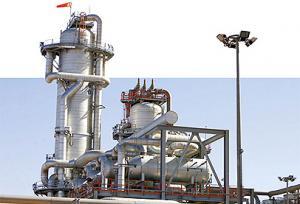Algeria announced bold changes to its hydrocarbon development policy, including the resumption of a $70 billion shale gas project. The project to tap into the country’s extensive shale reserves would represent the first non-conventional gas boom outside the United States but has encountered resistance due to environmental concerns.
Algerian Prime Minister Ahmed Ouyahia on October 1 said the government would restart its shale gas development plan and revise the country’s hydrocarbon laws, ending a stipulation that joint ventures must leave Sonatrach, the national oil company, with at least 50% of shares.
A natural gas development programme using the controversial fracking method was suspended months after it began in 2015 after violent protests broke out in southern Algeria. Opponents argued “the gas of death” poses environmental risks, including the pollution of scarce water sources.
Ouyahia, who is struggling to bring the country out of a financial crunch, said the government was encouraging “investment in the hydrocarbon sector, namely shale gas, because of its potential and capacity.
“That will ensure an energy future for the country and give hope to the population,” he said in remarks carried by the official APS news agency.
Ouyahia said: “This law must be made more attractive because the sector is going through big changes… that are forcing Algeria to keep pace with the shifts.”
He added the country’s failure to attract foreign investors to help develop its conventional oil could be attributed to the law.
Foreign technology and money are crucial to boosting Algeria’s conventional reserves and tapping into shale gas but Algeria received bids for only 25% of concessions on offer during the last three licensing tenders in recent years.
During a meeting with the US Algeria Business Council, Algerian Energy Minister Mustapha Guitouni said: “We must go on developing the shale gas industry and we are going to do it.”
He expressed the need to cut rising domestic gas consumption, which is eating away at potential gas exports.
“Work to revise the hydrocarbon law is under way to make Algeria more attractive for foreign partners, namely in terms of drilling and developing hydrocarbons,” Guitouni added.
Sonatrach had planned to invest at least $70 billion over 20 years to produce 20 billion cubic metres (bcm) of shale gas per year from 200 sites. A pilot well was drilled in the Ahnet basin in 2012 and the Energy Ministry included 17 shale gas projects in its more recent upstream licensing round.
The US Energy Information Administration estimated that Algeria has 20 trillion cubic metres of recoverable shale gas reserves, making it the country with the third largest resource base after China and Argentina.
When protests against the project grew violent, former Prime Minister Abdelmalek Sellal shelved the plan. “Between shale gas and water, the Algerian people will choose water. You think the Algerian state would be crazy enough to endanger the lives of its citizens?” Sellal said.
Ouyahia, however, has switched course, saying the “government will not tolerate procrastination to develop energy resources to ensure a future for the energy sector.”
“Oil will remain the engine of the country’s economy,” he said.
A worsening economic crisis appears to be behind the Algerian government’s change in energy policy. Ouyahia in September told parliament that the economic situation “is hell” and that “the state coffers are almost empty.”
Algeria plunged into a severe financial crisis after oil prices fell in 2014. The country’s economy is highly reliant on foreign oil and gas sales, which account for 95% of foreign currency earnings and 60% of budget revenue.
“It is high time that Sonatrach tap into and develop all resources of energy to further the interests of the company and the country,” Ouyahia said. “The government will continue assisting Sonatrach in its various investment projects.
“This is a message of hope for the country.”
Algerian energy expert Ait Ouarabi Mokrane said: “The brunt of the financial crisis is crushing. The government apparently decided to develop non-conventional energy resources like shale gas taking the risks to provoke the anger of the population living in the areas where such resources lie.”
Beyond public backlash, experts said the government could also run into significant challenges exploiting shale.
“I think it could be 10-12 years,” said former Sonatrach chief Nawim Zouioueche when asked when the project is likely to enter its production stage.
Algeria is a main exporter of gas to Europe but struggles to remain an energy power due to fierce competition from the United States, Australia and Mozambique, which have major plans to export liquefied natural gas.
It is crucial its shale gas production comes when the market is ready for the commodity and that Algeria competes against new suppliers.
Algeria’s gas output has gone down in recent years, from 88.2 bcm in 2005 to 78 bcm in 2016, official figures indicate. Local consumption has increased from 20.4 bcm in 2003 to 35 bcm in 2016.
Algerian experts said that, in view of the country’s gas reserves, production and consumption habits, developing shale gas is an economic necessity. To do so, however, Algeria must ease the concerns of its southern population, where opponents argue that fracking could contaminate its scarce water reserves.
Source: http://bit.ly/2yfNtiB











